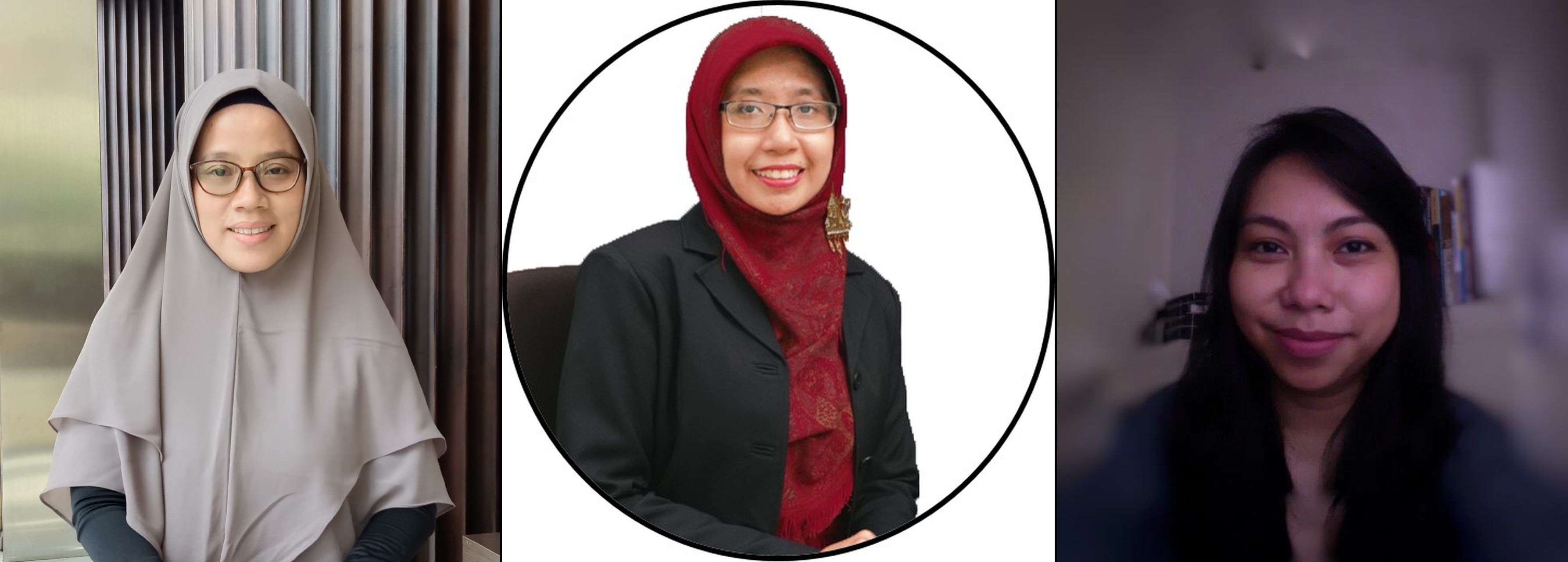15.07.2021
Identity Negotiations and Body Politics: Contemporary Issues of Indonesian Women, 11.00 a.m. – 1.00 p.m. CEST
Research Alumna Lisda Liyanti, Dr. Muthia Pramesti, Dr. Regina Widhiasti (University of Indonesia) share their research on contemporary issues of Indonesian women.
Speakers
Lisda Liyanti is a lecturer in German Studies Program, Faculty of Humanities. She was Erasmus Mundus Master Program Awardee and spent two semesters in Tuebingen University. Her research focus on space & identity and children & family in media.
Regina Widhiasti is a lecturer in the Department of Literature and the Head of German Studies Program, Faculty of Humanities, Universitas Indonesia. Her research and teaching focus on visual and popular culture, culinary practices, and representations of immigrants in films and literature. She received her doctorate in cultural studies from Universitas Indonesia in 2018.
Muthia Pramesti is a lecturer from Universitas Indonesia, Faculty Economics and Business. She is currently finalizing her Doctorate Dissertation writing about female workers well-being. She graduated Bachelor (in 2003) and Master Degree (2006) in Management. She started teaching in 2006 in Universitas Indonesia. She wrote publication with the area related with female worker, organization behavior, human resource management and financial management. She was involved as a research project member under ILO in 2015-2016 and IDRC Canada in 2017-2020. She is interested to do social activity and community engagement in female well being improvement.
Abstract
Despite the incessant activism on women's right and gender equality, there are continued challenges faced by women in Indonesia. This research highlights three specific cases to illustrate some of the struggles encountered by women in Indonesia and their strategies to overcome them.
(1) Economic empowerment of women has become a two-edged sword, especially during the pandemic. Forced to work from home, working mothers juggle to keep their lives in balance. Muthia Pramesti (FEB, Universitas Indonesia) observes the social demography of working mothers to understand the impact of the Covid-19 pandemic on Indonesian households and on working mothers in particular.
(2) Indonesian low-skilled workers who work abroad and marry an expatriate are commonly considered to be hick-girl and/or gold digger. Yet, the development of new media opens up the opportunity for them to express themself. Lisda Liyanti (FIB, Universitas Indonesia) examines the YouTube channel of these workers to looks at the dynamics of the identity negotiations of former Indonesian domestic workers.
(3). Towards the end of 2020, Gisella Anastasia, an Indonesian TV personality, was in the spotlight due to a leaked private video. Despite her nonchalant attitude, Gisella keeps on receiving slut-shaming comments on her social media. This self-righteous behaviour of Indonesian netizen is not uncommon. In various degrees, other Indonesian female celebrities are also targets for criticizing and slut-shaming comments, mainly when their behaviours are deemed inappropriate according to "the moral standards" and the so-called social norms. Using Gisella's case as an entry point, Regina Widhiasti (FIB, Universitas Indonesia) investigates the practice of regulating women's bodies through the imposed moral standards. We conducted three case studies using a descriptive analysis method to present an initial picture of three women's struggles with different social conditions and open global discussions.
Please send an email to alumni@uni-tuebingen.de to receive the zoom link.
ECTS points for students of the University of Tübingen: By attending the seminar series during the summer term and submitting an essay on a chosen topic, students can obtain 1 ECTS point. Please see ALMA for more information.
Code of Conduct
The Alumni Office and the Center for Gender and Diversity Research (ZGD) are dedicated to providing a harassment-free seminar experience for everyone, regardless of gender, gender identity and expression, sexual orientation, disability, physical appearance, body size, race, or religion. We do not tolerate harassment of participants in any form. Harassment includes offensive comments related to gender, gender identity and expression, sexual orientation, disability, mental illness, neuro(a)typicality, physical appearance, body size, race, or religion and deliberate misgendering or use of ‘dead’ or rejected name. The code of conduct applies to all Alumni and ZGD spaces, both online and off. Anyone who violates this code of conduct may be sanctioned or expelled from these spaces at the discretion of the alumni and ZGD team.

